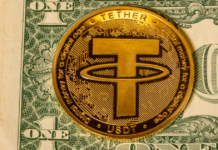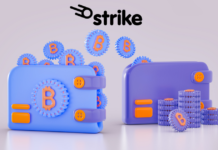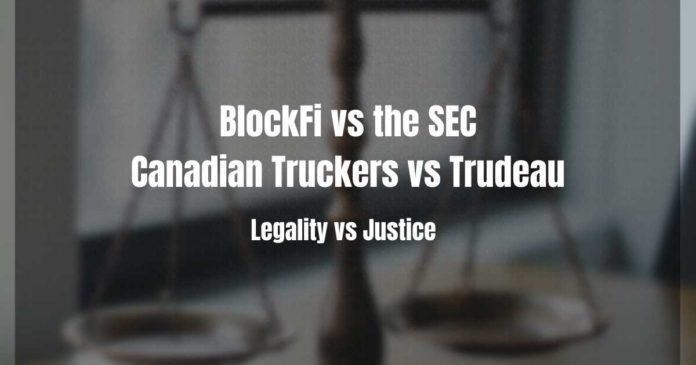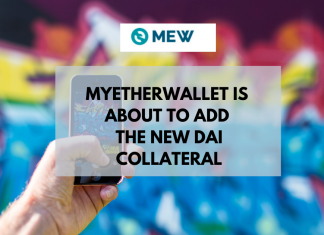BlockFi and Canadian Truckers are both fighting with their governments right now. The American and Canadian governments are overreaching their authority. On both counts, it involves crypto. The implications are defining moments for crypto.
The BlockFi settlement with the SEC does not only have a negative impact. The settlement may lead to an influx of traders into DeFi. The Canadian truckers are experiencing draconian measures against them from the Trudeau Government and the Emergencies Act. Free crypto promotion on a worldwide stage doesn’t get any better than this.
Background on the BlockFi Case
The BlockFi case dates back to the summer of 2021. One of the products that BlockFi offers is the BlockFi Interest Account (BIA). This is an interest-bearing account that offers an APY (Annual Percentage Yield) of up to 9%. That is a massive difference compared to the 0.05% that US banks offer nationwide.
During the summer of 2021, the SEC became interested in BlockFi. They started to investigate the platform’s BIA. These interest-bearing accounts work in a similar way as a bank’s savings account.
- Investors deposit money, the receiver lends this out and earns yield.
- In turn, the investors receive a percentage of this yield.
- Banks offer an average interest of around 0.05% and BlockFi offers up to 9%.
US banks offer their customers similar interest-bearing accounts. However, at paltry interest rates. Did you know that banks are not required to register their savings accounts? There are also no specific laws a bank needs to follow when offering this service.
Therefore, crypto platforms like BlockFi followed suit. However, instead of US dollars, they offer cryptocurrencies. The platforms expected that they filed under the same laws and requirements as banks.
That is where the SEC and state regulators come in with different views. They consider cryptocurrency loans to be debt securities. In turn, debt securities need registration. They also must follow specific securities laws.
Source: Pexels
What Is the Situation With the Canadian Truckers?
The situation with the Canadian truckers is different. They started to protest Covid-19 vaccine requirements on Jan. 22. A convoy of trucks departed British Columbia and arrived in Ottawa, the capital, a week later. During this week-long drive, plenty of unhappy Canadians joined them en route to Ottawa.
The new protesters are, in general, fed up with the many Covid-19 restrictions in Canada. Many right to far-right-wing political organizations also got involved. The protesters have a few blanket demands.
- Lifting of all pandemic restrictions in Canada
- Dissolve Parliament
- Remove Mr. Trudeau from office
In turn, Mr. Trudeau called the protests a “small fringe minority” at first. Public backing for the truckers from the beginning has been great. Canadian truckers are 90% vaccinated already. The majority of the Canadian population is in favor of the Covid-19 restrictions. However, although the protesters’ numbers are small, they get loads of attention.
Their traffic-blocking tactics worked well. Although, the protests don’t please the local community in Ottawa. Citizens cannot reach shops and facilities. Trucks honk their horns for 16 hours per day and there are reports of harassment.
Above all, the blockade of the Ambassador bridge made headlines. This is a vital connection between Canada and Detroit. Daily, up to $300 million of goods crosses this border. Car manufacturers had to close down in part because of this blockade. The Canadian police ended this blockade. The police started arresting the first people in Ottawa on Feb. 18.
Other Canadian cities followed suit and protests started. It didn’t take long for international support to start. Especially Trump supporters in the US gave financial support. In Europe, various countries saw similar convoys en route to their capital cities. The picture below shows Ottawa city center during the protests.
Source: The New York Times
What Is the Outcome for BlockFi and Crypto in General?
BlockFi entered lengthy negotiations with the SEC. Eventually, this led to an agreement with the SEC and US state regulators.
- BlockFi agrees to pay a $100 million settlement. $50 towards the SEC and $50 million towards 32 US states.
- The SEC considers the BlockFi Interest Account as a security offering. BlockFi must register this.
BlockFi already plans to do so. Once the SEC approves their S-1 submission, they can offer this account again. However, other exchanges are facing similar problems now. According to Bloomberg, Gemini and the Celsius Network are now under SEC scrutiny.
The general impact of this news on the crypto industry is seen as devastating. Centralized crypto exchanges can no longer offer crypto lending. Unless the SEC approves their S-1 submission. The direct impact for US citizens is that crypto lending is not available for them anymore. BlockFi can keep offering this service outside the US, but not inside the US.
It’s not all doom and gloom, though. As of now, there is a clearer regulation in place. Interest-bearing crypto accounts know the regulations now. In itself, the crypto industry can do with some form of regulation. Not everybody will like the outcome, but at least there is clarity. Also, with these regulations in place, US citizens will be able to earn a 9% APY in the future. Considering the current inflation, this is a positive situation. Portfolios all around will enjoy this development.
However, the biggest winners seem to be DeFi lending protocols. Will they see a new stream of DeFi users entering their platforms? The answer is, why not? DeFi has no KYC or AML screening. Of utter importance is their decentralized status. For the time being, DeFi avoided regulation. Nonetheless, the SEC will start aiming their arrows at DeFi too.
How Is the Canadian Trucker Situation Developing?
The Canadian trucker situation saw some drastic developments. Mr. Trudeau pulled an unexpected cat out of the hat. He invoked the Emergencies Act, a law dating back to 1988, for the first time. This gave free-range to banks to freeze personal bank accounts without notification. Banks also remain free from litigation for doing so.
A GoFundMe campaign raised millions of dollars in support for the truckers. The crowdfunding site closed down this account. The reason given included violence at the protest sites. An alternative account (Tallycoin), also raised $1 million in Bitcoin (BTC).
This is where things become rather interesting. The Royal Canadian Mounted Police (RCMP) is now going after 34 crypto accounts. These include addresses on various cryptocurrency wallets. Listed are Bitcoin, Ether, Monero, Litecoin and Cardano wallets. Canadian exchanges have received a letter from the RCMP. Exchanges must make any transaction on these wallets available to the police.
Many people see the Emergency Act used in this way as undemocratic. When legal repercussions are not possible, this act may well be unconstitutional. However, the Canadian population is not impressed. Any demonstrations against the use of this law are absent. No country has yet protested against Mr. Trudeau. Only the president of El Salvador, Nayib Bukele, has made comments on Twitter.
Are these the people who like to give lessons to other countries about democracy and freedom?
This is one of the top ranking countries in the “democracy index”?
Your credibility on these topics is now worth 0.pic.twitter.com/wCjh9bXwDt
— Nayib Bukele (@nayibbukele) February 15, 2022
Conclusion
The BlockFi settlement has stirred many emotions in the US crypto space. Some say that it is a blow to the crypto lending business model in the US. On the other hand, others are happy with clear regulations. Either side can be right, but it will depend on each individual situation. DeFi lending options are an alternative. However, the SEC may already be sharpening their knives for the DeFi sector.
For the actions of the Canadian government, there is only one word: Draconian. Whether you are for or against the protesters should not matter if you look at the bigger picture. The road Mr. Trudeau took, is a dangerous one. Democratic values are under attack.
In addition, join us on Telegram to receive free trading signals.
For more cryptocurrency news, check out the Altcoin Buzz YouTube channel.





























